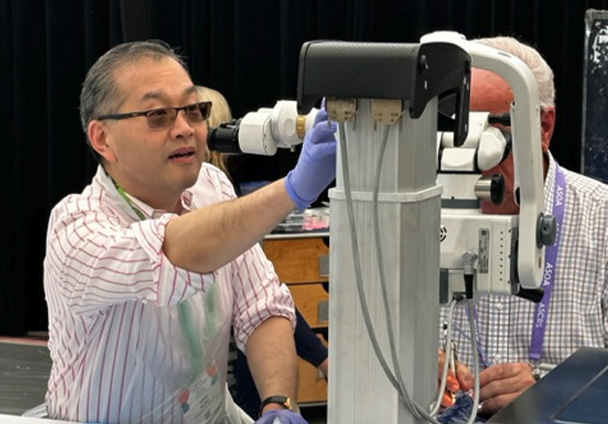About the Cornea
The cornea is the clear outer layer located at the front of the eye. It helps with focusing light that enters the eye so that you can see clearly. It also provides much of the focusing power of the eye. Most refractive errors, such as farsightedness, nearsightedness, and astigmatism are due to issues with the cornea.
Common Issues that can occur include:
To learn more about these issues, click the links above.
At Kung Eye Center, we offer the following corneal treatments:
Keratoconus
Keratoconus is a progressive eye disease that occurs on the cornea, the clear part on the front surface of your eye. Keratoconus causes the cornea to become gradually thinner, which can lead to the outward bulging of the cornea. This can cause a cone-like appearance to occur within the damaged cornea. The disease can cause vision to become extremely blurry and many patients complain of sensitivity to light.
Corneal Collagen Cross-Linking
The corneal cross-linking procedure, or CXL for short, uses ultraviolet (UV) light and vitamin B2 (riboflavin) eye drops to encourage the growth of collagen fibers and healthy cornea tissue to strengthen the cornea. This treatment is the first of its kind to have the ability to slow or halt the progression of keratoconus, and it also improves the vision in over 50% of the patients that are treated. In the past, patients with keratoconus would often have to have a full-thickness cornea transplant, deep anterior lamellar keratoplasty (DALK). But now, corneal cross-linking surgery may allow patients with this eye disease to live a normal life by slowing or stopping the progression of keratoconus.
Fuchs’ Dystrophy/Dsaek
Fuchs’ dystrophy is a disease of the cornea that affects the endothelium layer, which is the innermost layer of the cornea. The endothelium layer consists of a group of cells that help keep the cornea clear by pumping out excess fluid. When the cells undergo degenerative changes, they can diminish and fluid can start to build up. This condition causes the cornea to swell, become cloudy and cause a loss of clear vision.
In order to manage Fuchs’ dystrophy and to improve vision, corneal surgeons today can perform a partial corneal transplantation called Descemet Stripping Automated Endothelial Keratoplasty (DSAEK), which removes the damaged endothelial cells and replaces them with healthy donor tissue to improve the clarity of the cornea. This is an outpatient procedure, meaning patients can return home after surgery.
Frequently Asked Questions about Cornea Surgery
Are there artificial corneas?
Yes. Artificial corneas can be implanted in certain situation such as chemical burns
Can you wear contact lenses after corneal transplant?
Yes it is possible to wear contact lenses after corneal transplant but you must let your doctor examine you to determine if you are a good candidate
Can a living person donate a cornea?
Corneal tissue can only be harvested from the deceased
Do corneal transplants last forever?
Because a corneal transplant is biological tissue, they sometimes can opacify and need to be re-transplanted
Can I wear glasses after corneal transplant?
Many patients do need to wear glasses after corneal transplant in order to see clearer
Does cornea transplant change eye color?
Your eye color generally will not change after corneal transplant surgery as your eye color is determined by your iris
Can you have a second corneal transplant?
Yes if the first corneal transplant fails, your surgeon may elect to perform a second transplant
How long after a corneal transplant can you fly?
Generally speaking most patients are stable enough to fly after several weeks of having the transplant but you need to discuss this with your surgeon
How long does it take to recover from a corneal transplant?
Corneal transplants have a wide range of recovery periods. Patients may take up to a year to heal
Is corneal transplant major surgery?
Corneal transplant is considered major eye surgery. Since the front of you eye will be exchanged with someone elses tissue
How many times can you have a corneal transplant?
Patients ,may need to be transplanted multiple times if the cornea fails or rejects. In principle, the chance of rejection increases with repeated transplants
What are the signs of corneal transplant rejection?
The eye may turn red, be painful or become cloudy as the cornea rejects
How serious is a cornea transplant?
Corneal transplants are major eye surgeries, exchanging the front part of your eye
What can I expect after a corneal transplant?
Your eye may be irritated, red or swollen immediately after surgery and will need medication and care to heal
How soon can I drive after a corneal transplant?
You will need to ask your surgeon about your specific case as some patients can drive quickly because the fellow eye sees very well
What can you not do after a corneal transplant?
Patients should rest and not exert themselves too strenuously. Like playing sports or lifting heavy objects
What happens if a corneal transplant is rejected?
The cornea becomes cloudy and the patients vision becomes extremely blurred
What is a partial corneal transplant?
There is now technology to transplant certain layers of the cornea, rather than the entire thickness of the cornea
Who needs corneal transplant?
Patients who have a scarred, cloudy or opacified cornea that will not become clear with medication or by itself
Frequently Asked Questions about Cornea Transplant Surgery
Are there artificial corneas?
Yes. Artificial corneas can be implanted in certain situation such as chemical burns
Can you wear contact lenses after corneal transplant?
Yes it is possible to wear contact lenses after corneal transplant but you must let your doctor examine you to determine if you are a good candidate
Can a living person donate a cornea?
Corneal tissue can only be harvested from the deceased
Do corneal transplants last forever?
Because a corneal transplant is biological tissue, they sometimes can opacify and need to be re-transplanted
Can I wear glasses after corneal transplant?
Many patients do need to wear glasses after corneal transplant in order to see clearer
Does cornea transplant change eye color?
Your eye color generally will not change after corneal transplant surgery as your eye color is determined by your iris
Can you have a second corneal transplant?
Yes if the first corneal transplant fails, your surgeon may elect to perform a second transplant
How long after a corneal transplant can you fly?
Generally speaking most patients are stable enough to fly after several weeks of having the transplant but you need to discuss this with your surgeon
How long does it take to recover from a corneal transplant?
Corneal transplants have a wide range of recovery periods. Patients may take up to a year to heal
Is corneal transplant major surgery?
Corneal transplant is considered major eye surgery. Since the front of you eye will be exchanged with someone elses tissue
How many times can you have a corneal transplant?
Patients ,may need to be transplanted multiple times if the cornea fails or rejects. In principle, the chance of rejection increases with repeated transplants
What are the signs of corneal transplant rejection?
The eye may turn red, be painful or become cloudy as the cornea rejects
How serious is a cornea transplant?
Corneal transplants are major eye surgeries, exchanging the front part of your eye
What can I expect after a corneal transplant?
Your eye may be irritated, red or swollen immediately after surgery and will need medication and care to heal
How soon can I drive after a corneal transplant?
You will need to ask your surgeon about your specific case as some patients can drive quickly because the fellow eye sees very well
What can you not do after a corneal transplant?
Patients should rest and not exert themselves too strenuously. Like playing sports or lifting heavy objects
What happens if a corneal transplant is rejected?
The cornea becomes cloudy and the patients vision becomes extremely blurred
What is a partial corneal transplant?
There is now technology to transplant certain layers of the cornea, rather than the entire thickness of the cornea
Who needs corneal transplant?
Patients who have a scarred, cloudy or opacified cornea that will not become clear with medication or by itself
If you are interested in learning more about our corneal treatments or would like to schedule an appointment with one of our eye care specialists, contact Kung Eye today! We will be happy to assist you in scheduling your appointment.
 Introduction Videos
Introduction Videos
Our Expert Team
Dr. Kung’s mastery in ophthalmology means you will receive thoroughly informed recommendations for vision correction and maintenance, and that your treatment will be expertly performed for the best possible results.
MEET THE DOCTORS
Kung Eye is a World Class Instruction & Leader for Continuing Eye Surgeons' Education
LEARN MORE


